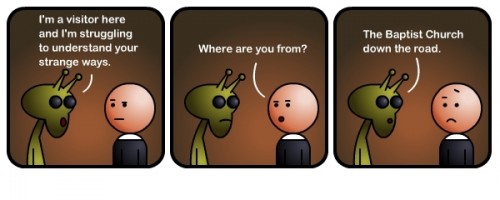A good, three-point alliterative post title. Someone, somewhere would be pleased.
Posting 'late' today because I have been busy doing stuff, notably eating porridge and praying with our local Presbyterians.
The C of S church with whom we share our evening services has just started a once a month prayer breakfast and I was invited to go along. For £1 you could have a big bowl of porridge (made by someone from Florida!!!) or a bacon buttie and as much tea or coffee as you wanted. Then at 8:30 we shared in a simple act of guided prayer. After that was the C of S "fraternal" (spit!) to which I am invited, and am beginning to discover more of the weird and wonderful nature of this tradition. Oh, I am so glad I'm a Baptist!!!!!
Eleven of us shared breakfast and prayers. And we were a motley crew. Mostly retired people or ministers, we included someone off to Berkshire to protest outside somewhere I have worked and with whom, despite her initial defensiveness, I had an interesting conversation.
I was reminded of various things - such as the porridge/cornflakes graces:
Lord, make us not like porridge:
Sticky and hard to stir.
Make us like cornflakes:
Easy to stir and ready to serve.
and
Lord, make us to be, not like cornflakes:
Noisy, superficial, and cold;
But like porridge:
Sturdy, warm, and comforting.
Well, in my own fence sitting fashion, "both/and" actually
A good start to the day,and something I will look forward to again next 'First Tuesday' and will be encouraging others to consider attending. But now I really must do what I'm paid for...
